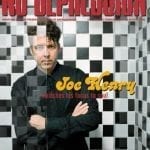The Third Annual No Depression Critics’ Poll
SUNDAY MORNING, RISING UP
For some months it has been clear that many of the albums which provoked delight this year were, quite unexpectedly, of a spiritual bent, of a gospel flavor. Songs about god, if not country.
My churchgoing friends, including Pastor Molly, for whom we will cook dinner in a few days, would doubtless suggest I attend to the message of this music, though I’m not certain they would hear the spirit in Mary Gauthier’s Mercy Now, nor in Bettye LaVette’s I’ve Got My Own Hell To Raise.
At the slight risk of protesting too much, I’ve never found my faith in religious books and buildings. Once or twice each year, as a courtesy and a curiosity, I walk through that door, and it never feels nearly as much like home as do the peaceful mountains outside. And, anyway, I am rarely drawn into music by lyrics (though inelegant words will push me away quicker even than tuneless vocals). It is the sound of things that captivates the ear, and then, maybe, the sense of them.
The other inescapable truth of my year-end list (and I sought particularly to frame choices around discs listened to for pleasure, not the anointed art one hears and reveres for duty) is that my divorce from what is now called indie rock seems nearly complete.
This is troublesome, and confusing. I have watched too many peers stop listening and build careers around the static past. I accept that punk is inherently too adolescent for my middle years, but the impulse to rock, and loudly, has hardly vanished.
Nevertheless, I remain largely deaf to the charms of the various indie-rock artists whose work is proposed for these pages, and I could rarely explain — based on my listening alone — why some are featured and others are ignored.
What, then?
This: One single, beautifully crisp moment amid the third song on When The Morning Comes, the new bluegrass gospel album (too new to have made my list, in fact) from Paul Williams & the Victory Trio. One solitary vocal phrase, the title to Squire Parsons Jr.’s deathbed song, “I Call It Home”. It turns this way: “Some call it heaven/I call it home.” Paul Williams’ voice, still the stuff of legend, rises up to that second line with a ferocious certainty that is simply stunning, and then goes back about its business.
But it is enough, for it is an answer of an unexpected kind.
The truth is (or, at least, my truth is) that most of the artists I listened to this year — Marty Stuart, Doyle Lawson, LaVette, even Lee Ann Womack — simply rock harder than today’s indie-rock darlings.
Which is, perhaps, a matter of perspective.
These last few days I have also been listening to the remastered Talking Heads box, and to the new John Fogerty compilation. And, at ear-splitting volume, to Spiderbait’s brilliant remake of Lead Belly’s “Black Betty”, though I suspect, they, too, learned it from Ram Jam’s ’70s cover (alas, it’s the only spectacular song on Tonight Alright).
They all rock, and I think I have found what I am looking for, what I have been missing: Certainty, confidence, even cockiness. Clarity.
Rock ‘n’ roll is black and white music, both in its lineage and in its formulae. It does not dwell easily (nor for long) in gray areas. Even the searching songs — Bono, Spencer Davis Group, whatever — have a certainty about what’s missing.
And that is what’s missing. Indie rock seems all gray areas and self-reflexive noodling subtleties that are lost on me, and I’m a guy whose writing, when it’s any good, is all about those gray areas. Emo notwithstanding (and I’ve always found its precious tunelessness to be unlistenable), it is almost as if we’re going through a different version of the prog-rock era, in which young rockers wish so much to be taken as serious artists that they lose sight of the simple, glorious fun of cutting loose and saying what they really mean.
In which way, of course, they mirror much of society, thus still doing the most important job of art — letting us look at ourselves in a mirror we did not hang.
Which, I think, is why I respond so joyously to the absolute certainty of gospel music, and to the careful questing implicit throughout Mary Gauthier’s best work. It may also explain the mystery Thomas Frank was unable to solve in his somewhat glib book, What’s The Matter With Kansas? People who are certain they’re going to heaven really will vote against their best interests here on earth — particularly if they imagine that doing so will get them through those gates.
I wish I had their certainty. I wish they had my faith.
–GRANT ALDEN




